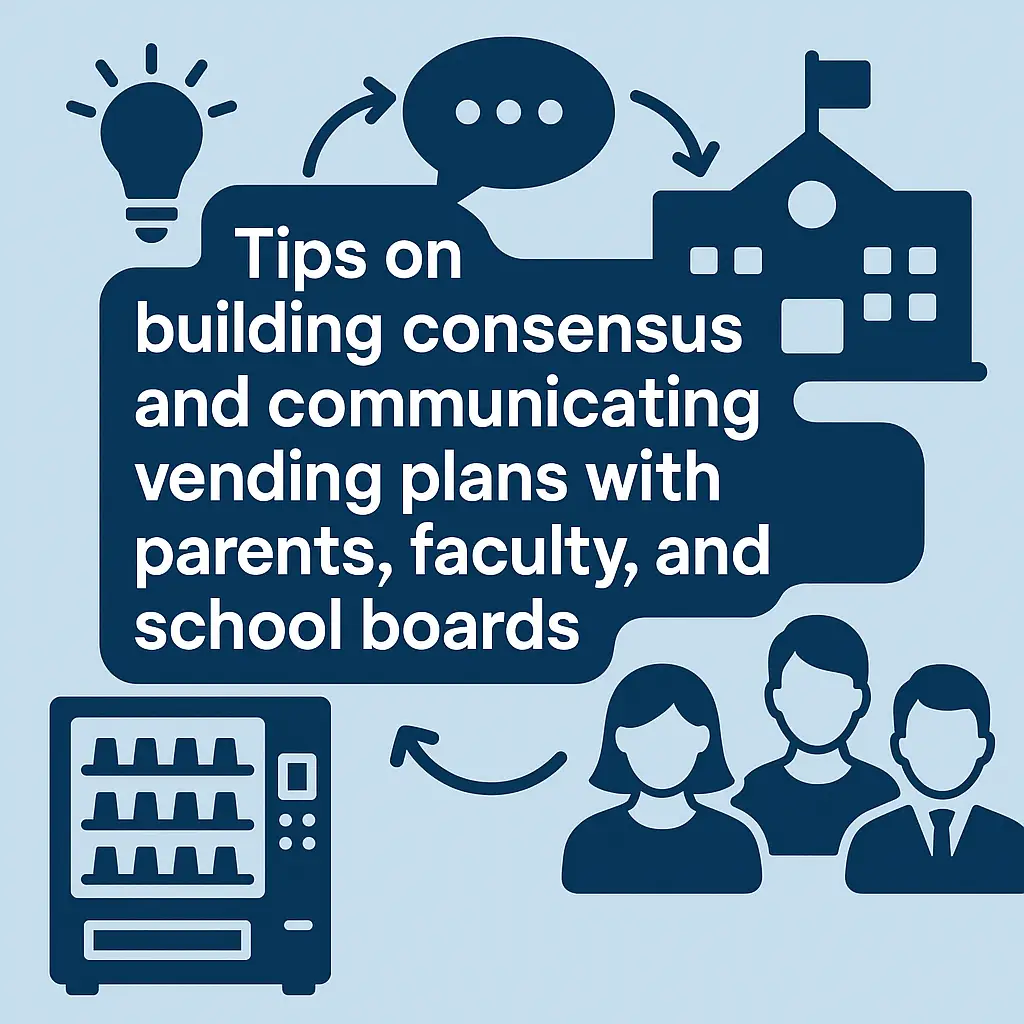Parent and Staff Approval for School Vending
Tips on building consensus and communicating vending plans with parents, faculty, and school boards.
Back to Vending for Schools ResourcesTips on building consensus and communicating vending plans with parents, faculty, and school boards.
Back to Vending for Schools ResourcesBuilding consensus requires addressing nutrition concerns, outlining service benefits, and involving stakeholders early. Share machine types, product selections, and payment options to gain staff and parent confidence. Vending Exchange provides supporting resources to simplify the process.
![]() Transparent communication helps prevent misunderstandings and builds trust
Transparent communication helps prevent misunderstandings and builds trust
![]() Healthy vending can align with wellness policies and parental expectations
Healthy vending can align with wellness policies and parental expectations
![]() Input from staff ensures vending supports school routines and operations
Input from staff ensures vending supports school routines and operations

Introducing vending machines to a school campus can be met with hesitation—especially from parents, teachers, and board members. Concerns about nutritional value, student access, and machine reliability often lead to roadblocks. To ensure a successful rollout, it’s important to engage stakeholders early and transparently.
Start by aligning your vending plan with your school’s broader wellness policies. Present machine options that support healthy choices, including smart vending machines with contactless payment, healthy snack combos, and shelf-stable meals. Highlight curated product lists that include low-sugar, protein-rich, and allergy-conscious items. This reassures parents that student health remains a priority.
Faculty and staff should also be brought into the discussion. Address common issues such as machine downtime, expired products, or maintenance challenges. By partnering with a reliable local vending operator, schools can ensure machines are regularly serviced and stocked with fresh items. Mentioning options like AI vending solutions with real-time inventory tracking can help build confidence in the technology’s reliability.
When involving school boards, come equipped with a vending proposal that outlines benefits like reduced cafeteria strain, extended access to snacks during after-school events, and no-cost equipment installation. Boards often appreciate detailed service arrangements and projected upkeep responsibilities. Consider referencing how vending services parallel well-managed breakroom setups that reliably support staff and students alike.
Finally, offer channels for feedback and ongoing evaluation. A quarterly review or feedback survey allows parents and staff to voice concerns and influence vending inventory. Maintaining an open feedback loop demonstrates your commitment to balancing convenience and accountability in your school’s vending approach.
If you're exploring vending options for your business, Vending Exchange can help simplify the process. Delivery, Installation and Equipment is provided at no cost to you - vendors provide the machines, keep them stocked, and handle all servicing. Whether you need a provider or full-service management, just fill out the form on this page to get started.
Highlight healthy vending options like low-sugar snacks, fruits, and protein items. You can also involve parents in approving the product list.
You can set machine timers to disable access during class periods or provide access only during breaks and after-school hours.
Work with reliable vendors who offer regular maintenance and restocking services, and who respond promptly to service requests.
Include key information like machine types, vendors, product options, and student health benefits. Be prepared to address cost and service expectations.
Yes, including staff ensures you get input on product needs, ideal machine placement, and operational concerns during school hours.
Use surveys at PTA meetings or digital polls to get feedback on products, usage, and any concerns after the program starts.
Yes, many vending vendors offer product lines specifically designed to meet local district wellness guidelines and nutrition standards.
Smart vending machines with contactless payment and inventory tracking offer transparency and better control over nutritional content.
No—vendors typically provide installation, maintenance, and machines at no cost to qualifying schools.
Yes, vending programs can be adjusted seasonally or based on feedback from students, staff, or parents to better match needs.